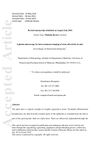 16 citations,
September 2016 in “Experimental Dermatology”
16 citations,
September 2016 in “Experimental Dermatology” Two-photon microscopy effectively tracks live stem cell activity in mouse skin with minimal harm and clear images.
 1 citations,
January 2016 in “Elsevier eBooks”
1 citations,
January 2016 in “Elsevier eBooks” The document concludes that identifying the specific cells where skin cancers begin is important for creating better prevention, detection, and treatment methods.
 January 2016 in “Georg Thieme Verlag eBooks”
January 2016 in “Georg Thieme Verlag eBooks” Hair transplantation in East Asians needs special techniques to ensure natural results and prevent complications due to their unique hair and scalp characteristics.
 47 citations,
July 2013 in “Pharmacological Reviews”
47 citations,
July 2013 in “Pharmacological Reviews” Regenerative pharmacology, which combines drugs with regenerative medicine, shows promise for repairing damaged body parts and needs more interdisciplinary research.
 17 citations,
December 2019 in “Stem Cells International”
17 citations,
December 2019 in “Stem Cells International” Bioactive molecules show promise for improving skin repair and regeneration by overcoming current challenges with further research.
 2 citations,
October 1998 in “Family Practice”
2 citations,
October 1998 in “Family Practice” New oral treatment, finasteride, effectively and safely treats common hair loss.
 5 citations,
June 2012 in “The journal of investigative dermatology/Journal of investigative dermatology”
5 citations,
June 2012 in “The journal of investigative dermatology/Journal of investigative dermatology” Putting thymidine dinucleotide on newborn mice's skin can delay and reduce skin cancer.
 56 citations,
November 1993 in “Journal of The American Academy of Dermatology”
56 citations,
November 1993 in “Journal of The American Academy of Dermatology” Capsaicin cream quickly relieved itching in two patients with brachioradial pruritus.
 5 citations,
September 2022 in “Journal of Investigative Dermatology”
5 citations,
September 2022 in “Journal of Investigative Dermatology” Careful selection of mice by genetics and age, and controlled housing conditions improve the reliability of hair regrowth in wound healing tests.
 2 citations,
February 2014 in “Hair therapy & transplantation”
2 citations,
February 2014 in “Hair therapy & transplantation” Alopecia Areata is an autoimmune condition causing hair loss, influenced by genetics, environment, and possibly improved by anti-MIF therapy, with many patients experiencing regrowth within a year.
 1 citations,
January 2020 in “Aesthetic Surgery Journal”
1 citations,
January 2020 in “Aesthetic Surgery Journal” Platelet-rich plasma and stem cell therapies are accepted treatments for hair restoration, with specific protocols recommended for best results, but more standardization is needed in stem cell use.

AGA causes permanent hair loss; women use 2% minoxidil, men use 1 mg finasteride daily.
 April 2008 in “Blackwell Publishing Ltd eBooks”
April 2008 in “Blackwell Publishing Ltd eBooks” AGA causes permanent hair loss; minoxidil helps men, finasteride helps men, minoxidil somewhat helps women, estrogens/antiandrogens lack evidence for women.
 November 1999 in “Journal of Cutaneous Medicine and Surgery”
November 1999 in “Journal of Cutaneous Medicine and Surgery” Treatments for hair loss include hormone modifiers, minoxidil, and hair transplant surgery.
 666 citations,
September 1977 in “British Journal of Dermatology”
666 citations,
September 1977 in “British Journal of Dermatology” Common baldness, also known as Androgenetic Alopecia, is caused by a combination of genetic factors and hormones called androgens.
 293 citations,
November 2011 in “Nature”
293 citations,
November 2011 in “Nature” The circadian clock affects skin stem cell behavior, impacting aging and cancer risk.
 157 citations,
April 1994 in “Clinical endocrinology”
157 citations,
April 1994 in “Clinical endocrinology” Androgens can cause hair growth in some areas and hair loss on the scalp.
 140 citations,
February 2020 in “Frontiers in Plant Science”
140 citations,
February 2020 in “Frontiers in Plant Science” RNAi-based biopesticides could be safe and effective for pest control with careful development and risk assessment.
 103 citations,
June 2007 in “Endocrinology and Metabolism Clinics of North America”
103 citations,
June 2007 in “Endocrinology and Metabolism Clinics of North America” Male pattern hair loss is genetic and influenced by hormones, with treatments like minoxidil and surgery available.
 60 citations,
July 2011 in “Stem Cells and Development”
60 citations,
July 2011 in “Stem Cells and Development” Certain signals and genes play a key role in hair growth and regeneration, and understanding these could lead to new treatments for skin regeneration.
 43 citations,
April 2017 in “Experimental Dermatology”
43 citations,
April 2017 in “Experimental Dermatology” Female pattern hair loss has unclear causes, possibly involving genetics, hormones, and environment, and needs better treatments.
 32 citations,
July 2017 in “Clinical and Experimental Dermatology”
32 citations,
July 2017 in “Clinical and Experimental Dermatology” Finasteride effectively treats hair loss in transgender men with few side effects.
 20 citations,
October 2013 in “British Journal of Dermatology”
20 citations,
October 2013 in “British Journal of Dermatology” The document concludes that clinicians should be aware of common hair and scalp disorders in women of African descent and that more research is needed to develop effective treatments.
 8 citations,
September 2010 in “Journal of Men's Health”
8 citations,
September 2010 in “Journal of Men's Health” Androgenic Alopecia, a common hair loss condition, can be effectively treated with finasteride and other treatments.
 5 citations,
February 2022 in “Acta Biomaterialia”
5 citations,
February 2022 in “Acta Biomaterialia” Nanomaterials can improve hair care products and treatments, including hair loss and alopecia, by enhancing stability and safety, and allowing controlled release of compounds, but their safety in cosmetics needs more understanding.
 March 2023 in “East African scholars journal of medical sciences”
March 2023 in “East African scholars journal of medical sciences” Metformin may help regulate periods and cause modest weight loss in PCOS patients, but more research is needed.
 June 2001 in “Annals of Internal Medicine”
June 2001 in “Annals of Internal Medicine” The document concludes that more research is needed on the hepatitis B vaccine's side effects and the effectiveness of certain treatments for specific diseases.
 May 1999 in “Drugs & Therapy Perspectives”
May 1999 in “Drugs & Therapy Perspectives” Finasteride helps increase or maintain hair in most men but can cause sexual side effects and should not be used by women, especially during pregnancy.
 301 citations,
February 2019 in “Nature Communications”
301 citations,
February 2019 in “Nature Communications” The research found that different types of fibroblasts are involved in wound healing and that some blood cells can turn into fat cells during this process.
 202 citations,
August 2017 in “Nature cell biology”
202 citations,
August 2017 in “Nature cell biology” Lactate production is important for activating hair growth stem cells.






























